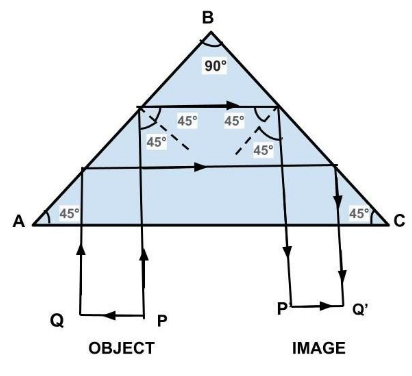Question
Question: What device other than a plane mirror can be used to turn a ray of light through \[180^\circ \] ? Dr...
What device other than a plane mirror can be used to turn a ray of light through 180∘ ? Draw a diagram in support of your answer. Name an instrument in which this device is used.
Solution
Before we go into the details, let's get a sense of what a fully reflecting prism is. When a light ray falls in a precise way on a specific side of this unusual form of prism, it can deviate a light ray by 180∘ . The name "total reflecting prism" comes from the fact that any light beam striking on one of its faces causes total internal reflection inside the prism.
Complete step by step answer:
To turn a ray of light 180∘ , a complete reflecting prism is employed. The diagram below clarifies things much more. The prism effect is employed in binoculars.

Explanation:- Conditions are as follows to get deviation of 180∘,
1. The use of a Total Reflecting Prism is required (right-angled isosceles prism with a 90∘ angle between two equal sides, and 2 more angles with 45∘ each)
2. Light should be incident normally on the side of the Total reflecting prism (right-angled isosceles prism) that forms a 45∘ angle with the other two sides.
Take a light ray PQ that is generally incident on AC in the diagram above (making a 90∘ angle with AC ). It enters the prism with no deviation and strikes the AB at a 45∘ angle of incidence, which is greater than the critical angle for the air-glass pair (42∘) .As a result, the light ray is subjected to total internal reflection at the surface AB.
As a result, it is completely internally reflected and strikes the side BC inside the prism with a 45∘ angle of incidence once more. Obviously, thorough internal reflection takes place here as well.It's clear that the ray of light deviates twice, once by 90∘ after reaching the AB side, and then by another 90∘ after hitting the BC side.With a prism, we may achieve a total 180∘ deviation of the light ray.
Note: The angle of incident must be greater than the critical angle of the prism for total internal reflection to occur, and the value of the critical angle of glass, 42∘ , should be kept in mind when solving prism and its applications issues.
